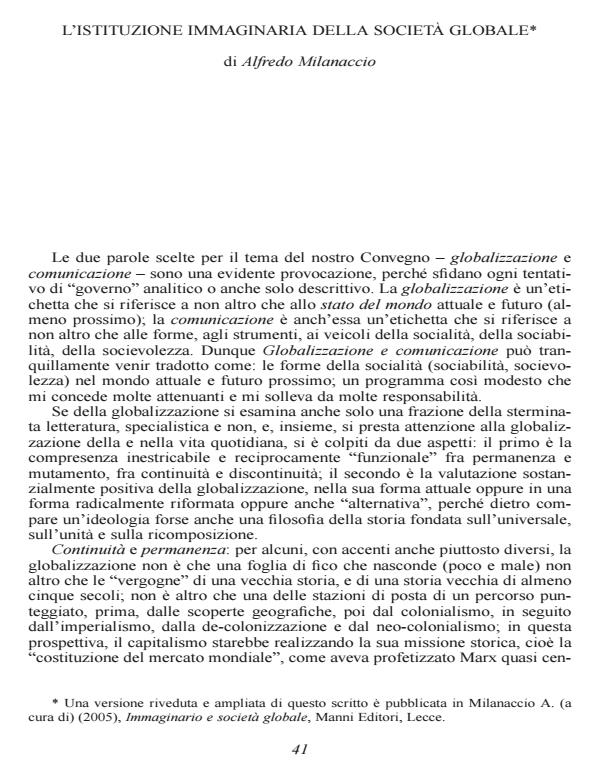L'istituzione immaginaria della società globale
Journal title SOCIOLOGIA DELLA COMUNICAZIONE
Author/s Alfredo Milanaccio
Publishing Year 2005 Issue 2005/37
Language Italian Pages 6 P. File size 29 KB
DOI
DOI is like a bar code for intellectual property: to have more infomation
click here
Below, you can see the article first page
If you want to buy this article in PDF format, you can do it, following the instructions to buy download credits

FrancoAngeli is member of Publishers International Linking Association, Inc (PILA), a not-for-profit association which run the CrossRef service enabling links to and from online scholarly content.
Globalization is at the same time label, metaphor, ideology, utopia and distopia, paradigm, empirically controllable ordering concept, and general and generic descriptive notion, by which we want, or profess, or need to give a meaning (the weberian subjektiv gemeinte Sinn), positive or negative, to the situation and contemporaneous human condition; the first and sometime only way to confirm such an intention or pretension or need of meaning is communication, especially in the form of NICT, the new information and communication technologies, in economy, culture, politics, war, entertainment. If we want to avoid philosophies of history, ideologies, utopias and distopias, which inevitably bring to meta-social and anti-sociological categories (Good against Evil, the unification of the human race, the end of the history and similar), trying to really explore the conditions where the intention, pretension or need of giving a meaning to the global society take a form, seems to be appropriate. To such a hard exploration, a help can come from some concepts let known by Cornelius Castoriadis thirty years ago: legein (from which logos, logic, though, telling) and teuchein (from which techné, technique, construction, making) and above all the relationship between instituting society and instituted society, where the social imagery, individual and collective, makes possible the representation of the meanings of the social-historical, that is creates the passage, never completely ended and exhaustible (a sort of simmelian endless fecundity of the life), between what is instituting and what is instituted. The (always) central position of the imagery in the formation and representation of the social-historical, that is of the instituted society, is simply crucial for the so said global society, really because it has been forming under our eyes (and from our hands_): we are living, and can observe, the instituting society; living, observing and analysing the social-historical while it is forming, is not the last challenge and most irrelevant opportunity that globalization and communication propose and, at the same time, offer to sociology, not to get an orthopaedic technique.
Alfredo Milanaccio, L'istituzione immaginaria della società globale in "SOCIOLOGIA DELLA COMUNICAZIONE " 37/2005, pp , DOI: